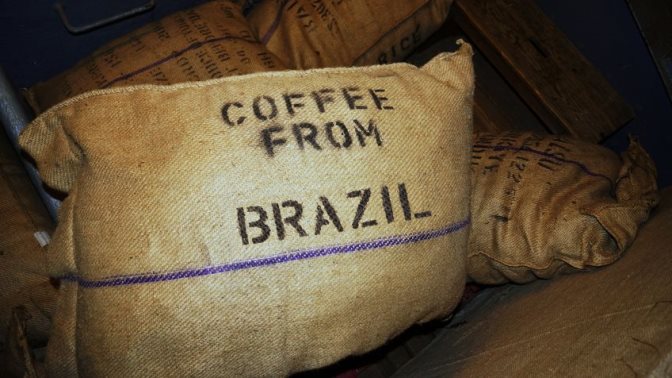
The pantheon of internationally desired goods amidst the coronavirus pandemic might soon be expanded to incorporate a new product – coffee. After the high demand for toilet paper has nearly wiped out the global stockpiles of the now precious commodity, and the price of sanitisers has skyrocketed, coffee might be on its way of becoming the next big thing on the agenda of essential goods for surviving self-isolation.
Over the last several days, social discontent with the Brazilian President Jair Bolsonaro has increased after his call for life in the country to return to normal as it was before the outbreak of the coronavirus. Public unrest in Brazil could very likely prompt the government to ramp up its efforts in curbing the spread of the pathogen.
If Brazil, which is the biggest producer and exporter of coffee in the world, goes on a national lockdown, global supply is very likely to suffer over the next few weeks. The demand for coffee, in contrast, can be expected to grow as more and more people are stuck in their homes. During a quarantine, everybody is his or her own barista, and even though people would not need caffeine in the mornings to get up and go to the office, the delicious drink makes passing time during the quarantine more tolerable.
So what happens when supply is expected to drop while demand is only going to continue rising globally over the next few weeks? Every first-year econ student is going to tell you that the price of the product is going to rise in order to reflect on the new equilibrium in the market. People are likely to start stockpiling coffee, but they are not going to do so only because they expect higher prices.
Just like toilet paper, coffee is not essential for survival. However, it is a keystone symbol of normality. Coffee represents regular life; it is the backbone of the daily routine for many individuals of different cultures all over the world. In that sense, coffee becomes vital in a time of social distancing as it reminds us of the time when national emergencies did not distort our lives, and we were not forced to confine ourselves within our own homes.
At times of great panic on Wall Street, investors typically scramble for the good old-fashioned safe havens like gold, which entail relative safety when uncertainty is abundant. However, traders would do well to look for protection in a new type of safe-haven asset, one which comes in bags full of big, black beans. The novel coronavirus crisis is unlike any other before it, so it only makes sense to look for diversification in novel havens.
Trendsharks Premium
Gold is undergoing a correction, as investors take profits to offset losses from falling stock prices, impacting their margins. However, we anticipate a renewed wave of [...]
The Swiss stock market index is mirroring its global counterparts, such as Germany 40 and US100, experiencing a sharp decline following the announcement of new [...]
We’re analyzing the weekly chart to grasp the broader market trend. Over the past three years, the US30 index has surged by 17,000 points, often resembling a nearly straight [...]
Over the past week, the DAX has experienced a sharp decline, plunging by an astonishing 3,400 points. This downward movement is not isolated, as its international counterparts, such as the UK100 and US100, are also facing significant [...]
EURUSD recently formed a double top at 1.0930, signaling a potential trend reversal, and has since begun a correction. After a 600-pip rally since early March, a pullback at this stage is both expected and healthy. Given these conditions, we are placing a [...]
Since early March, EURJPY has surged nearly 1,000 pips, providing us with several excellent trading opportunities. However, as the rally matures, many early buyers are beginning to take profits, leading to a noticeable slowdown in the uptrend. On Friday, the pair formed a [...]
The AUDJPY currency pair continues to be dominated by bullish momentum, as multiple golden cross patterns reaffirm the strength of the ongoing uptrend. Despite this, we are witnessing a much-needed [...]
The EURAUD currency pair appears to be undergoing a trend reversal, signaling a potential shift in market direction. A notable technical development is the formation of a Death Cross on the chart, a widely recognized bearish indicator that typically suggests a [...]
After securing an impressive 200-pip profit last week, the EURJPY currency pair is now undergoing a southward correction, retracing some of its recent gains. Despite this temporary pullback, the Golden Cross remains intact, reinforcing our view that the overall trend continues to be [...]
The appearance of a Golden Cross in Silver strengthens our analysis that the metal is currently in a strong uptrend, indicating further bullish momentum in the market. This technical pattern, where the short-term moving average crosses above the [...]
This trade presents a considerable level of risk and can be classified as an opportunistic move based on recent price action. The GBPUSD currency pair has experienced a substantial bullish rally, surging by nearly 500 pips in a strong upward movement. However, after this extended period of appreciation, the pair is showing signs of a potential [...]
The anticipated Death Cross on the SMI20 appears to be failing as price finds strong support at the 23% Fibonacci retracement level. After testing this area, the index has shown bullish strength, printing several large green candles, signaling an increase in [...]
A Golden Cross has just appeared on the USDJPY chart, signaling a potential bullish move. This technical pattern occurs when the 20 period moving average crosses above the 60 period moving average, a widely recognized indication of increasing [...]
After 2 months of a down trend, we finally see some indications of price recovery for Oil. The golden cross, a historic buy signal, supports this [...]
For the past month, the German DAX40 has experienced a remarkable 10% surge, reflecting strong bullish momentum. Despite ongoing market volatility and frequent pullbacks, every dip continues to attract fresh buyers, reinforcing the [...]
Oil continues its downward trajectory, despite occasional pullbacks. The overall trend remains bearish, reinforced by multiple Death Cross patterns, a classic sell signal indicating further weakness. Adding to this bearish outlook, the critical [...]
Over the past few days, gold has experienced a sharp decline of more than $100. This downturn can be attributed in part to traders securing profits to manage their margins, which are under strain due to the significant drop in major indices. Currently, gold has fallen below the [...]
The NASDAQ 100 index is showing strong bullish momentum, as evidenced by the formation of a Golden Cross on the chart. This classic buy signal occurs when the short moving average crosses above the long term moving average, suggesting that upward momentum is [...]
The EURAUD currency pair has encountered a significant resistance level, failing to break above the critical 61% Fibonacci retracement level. This suggests that bullish momentum is weakening, reinforcing the case for a potential downward move. Given this technical setup, we favor entering a [...]
The UK100 is experiencing a remarkable rally! Over the past few weeks, the British stock market index has surged nearly 800 points. Each minor dip has attracted more buyers, fueling the bullish momentum. However, since last week, we’ve observed a slight [...]




















